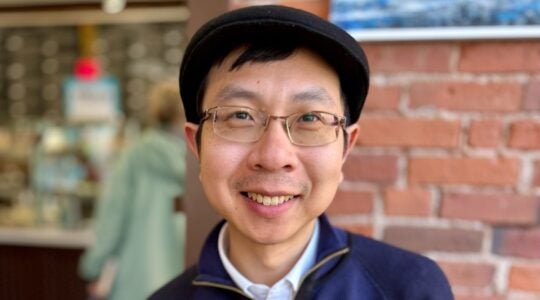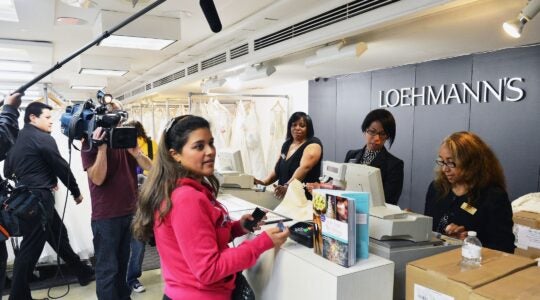When Ronit Levin Delgado signed up to host a Shabbat dinner that would bring together a cross-cultural group of millennials, she planned to keep it small. Living in a one-bedroom Prospect Lefferts Gardens apartment that realtors would call “cozy,” she figured she could accommodate at most 10 people.
But, being a typical Israeli, when people began asking if they could bring a friend — or two — she couldn’t say no. When the guest list hit 15, the multimedia artist got creative, giving the dinner a picnic theme, and painting several large forest-scapes to set the scene.
The dinner was part of a pilot program launched by UJA-Federation of New York’s year-old Kehilla Initiative, which aims to create a stronger sense of unity among the diverse patchwork of subgroups that make up New York’s Jewish community. Called “The Gathering,” the initiative has the goal of getting millennials from a variety of Jewish communities to mix it up at Shabbat dinners.
“There is a little bit of a missed opportunity to help those communities connect more with each other.”
“In our area alone there are a million and a half Jews and it’s also really diverse,” said Rebecca Saidlower, the Kehilla Initiative’s director. “Russian-speaking Jews, Israelis, Syrians, Persians and because the community here is so big, each of the subgroups is large,” she said. “They’re vibrant and they do their own thing really well, which we think is wonderful, but we also think there is a little bit of a missed opportunity to help those communities connect more with each other.”
The dinners are also an example of a recent trend in millennial engagement: letting millennials lead the way. While it once was enough for the younger generation to have a voice in Jewish leadership, a seat at the board meeting so to speak, now that’s not enough, said Evan Traylor, the Union for Reform Judaism’s first presidential fellow for millennial engagement. “I think that now we’re kind of shifting,” he said. “In the past it was OK to be part of the system, but now we want to be able to build something unique for ourselves.”
After all, who knows better what millennials want than millennials themselves, said Leora Kaye, programming director for the URJ. “They’re eating poke now. I don’t even know what that is.” (Pronounced poh-keh, it’s a raw fish salad.)
“In the past it was OK to be part of the system, but now we want to be able to build something unique for ourselves.”
The dinners, 11 in all, were hosted by members of the 10 participating organizations: Be’chol Lashon (which celebrates Jewish cultural and racial diversity), Jewish Multiracial Network, Jewish Queer Youth, Israeli American Council/Dor Chadash, Sephardic Community Alliance/iLead, Chassida Shmella (an Ethiopian Jewish organization), Repair the World, Council of Young Jewish Presidents and COJECO (Russian-speaking Jews).
The hosts advertised their dinners through the nonprofit OneTable, which encourages 20- and 30-somethings to hold Shabbat dinners by subsidizing food costs, offering coaching to Shabbat hosts and providing an online platform that allows hosts and guests to match up. Ninety-five people, mostly but not exclusively from the 10 host organizations, attended the dinners, which were held over two Friday evenings, March 17 and March 24, according to UJA.
In addition to building bridges among participants of the dinners, the project also served the equally important purpose of building bridges among the participating organizations, Saidlower said.
“We find that often the real impact comes from the partnerships that build from the work that happens when different institutions work together,” she said. “Once you know who to call at another institution it becomes a lot easier to partner.”
At Delgado’s indoor picnic, the guests arranged themselves in a rough circle in the small living room, sitting on the floor, two couches and a few chairs. In addition to the paintings, Delgado, in her 20s, set the bucolic scene by playing nature sounds and burning incense. Then she lit the Shabbat candles and the group said prayers over the candles, challah and wine.
The guests skewed artistic, with at least three singer-songwriters, a music manager, a filmmaker, at least three multimedia artists, a photographer, a poet and an actress/comedian who is working on a one-woman musical, “Ali Levin: 13 Blessings,” about “bat mitzvah culture and ritual” that Levin is set to perform on July 15th at Reckless Theatre in Manhattan.
In other ways, though, they were diverse, with attendees coming from LGBTQ, Russian, Israeli, Ashkenazi and Sephardic backgrounds and with an age-range spanning from early 20s to late 30s. At least three of them worked outside of the art world: a veterinarian, a software engineer and an account manager for a fashion designer.
Delgado, who is a painter, sculptor and video artist, only knew one of the guests in advance. Her recent body of work, “The Kissing Wall,” about the Western Wall and ritual, is part of a show that opens at Gallery Aferro in Newark this weekend. Delgado believes the reason her dinner drew so many artists is because of her description, which noted that there would be belly dancing and a jam session.
The opportunity for hosts to describe their plans for the Shabbat dinner is one of OneTable’s features that makes the program work. It allows people to sort themselves into groups with similar interests. While Delgado’s group drew artists, Rabbi Isaiah J. Rothstein, who was hosting on behalf of the Jewish Multicultural Network and Be’chol Lashon, had a more earnest theme.
“Shalom Dear Friends,” wrote Rabbi Rothstein, Be’chol Lashon’s New York program coordinator, in an email to the guests. “Tomorrow night … we dream together of a world where nothing and no one is left out. It is our vision we build over this meal, and I am honored to see it together with you.”
Rabbi Rothstein, who was raised in a mixed-race Orthodox home in Monsey, served a Mideast-themed menu, using the $15-per-head subsidy to order enough schwarma, falafel, hummus and Israeli salad to make his Washington Heights living room “smell like a falafel stand.” His event began with optional services at The Beis Community, an innovative Orthodox minyan where Rothstein is a lay leader.
Delgado also opted for a Mideast menu, serving a homemade dinner that included hummus, Israeli salad and shakshuka. While the guests ate, each person was asked to divulge something surprising about themselves and something they’ve recently been inspired by.
“Because I don’t have a family here. I create my own family.” – Ronit Levin Delgado
After dinner two of the singer-songwriters performed. Eva Meiling Pollitt debuted “To Mah Mice,” about her rodent roommates, with such lines as “My exterminator tells us … to just pretend we’re camping.” Then came the promised belly dancing followed by a tipsy midnight sing-along that was briefly streamed on Facebook. A few days later, one of the guests invited everyone from the dinner to her own OneTable Shabbat dinner.
Danny Ghitis, a photographer/life coach-to-be, and Revital Roza, a singer-songwriter/digital news production director, said they signed up for the dinner because they “wanted to be proactive about our social life.”
Ruthie Nachmany, a software engineer, was attracted by the “do-it-yourself element where everyone is creating a Shabbat table together.”
Delgado chose to host the dinner (under the auspices of COJECO — half Russian, Delgado speaks the language fluently) because the idea made her nostalgic for the Shabbat dinners of her youth.
“Because I don’t have a family here,” she said, “I create my own family.”
In Washington Heights, Rabbi Rothstein’s guests also had a sing-along, but of “traditional songs,” and talked about “inclusion and diversity.”
This contrast fulfills one of the goals of the project: allowing millennials to lead — the strategy of so many organizations of late, from the Union for Reform Judaism’s JewV’Nation fellowships, to Moishe House, to Repair the World, all of which provide resources to allow millennials to create their own communities.
Sometimes Jewish organizations fund existing projects. A good example of this is The Beis Community, which was created organically by millennials but has since received funding from UJA-Federation, Hazon, OneTable and the Orthodox Union’s NextGen division. “We’re a grassroots community — not a rabbinic couple running a program, nor an organization or a shul … . It makes us harder to define, but it’s unique and it’s very much at the core of what we are,” the organization’s website said.
Rabbi Rothstein agreed that there’s been a shift in response to “how millennials engage in Jewish practice,” from large communal organizations to “micro-communities [that] can be built in a multitude of ways in any setting, especially with Shabbat at its center.”
“There’s something really appealing about being invited into somebody’s home … and having various people bring food and connect in their own way. Having more control over that experience, I think, is something my generation really clings to.”
Ali Levin, 27, a comedian, definitely fits the profile of the millennial ethos. “I think personally my peers are less inclined to attend something that has an organization affiliated with it,” she said.
“I think this growing trend of people hosting potlucks of sorts — that feels very much in line with the way people my age relate with each other,” she said. “There’s something really appealing about being invited into somebody’s home … and having various people bring food and connect in their own way. Having more control over that experience, I think, is something my generation really clings to.”
The New York Jewish Week brings you the stories behind the headlines, keeping you connected to Jewish life in New York. Help sustain the reporting you trust by donating today.




